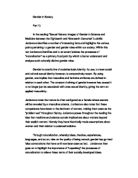Are children born with a gender stereotype? I think it is down to primary or secondary socialisation, Nature or Nurture. Do children get their gender image from primary socialisation, from their toys, clothes, praise from adults and the games they play or do they get them from secondary socialisation, from the media, their peers, education and in later life employment
We gender stereotype in many different ways. We gender stereotype young children from the moment that they are born. We dress all little boys in blues and reds and we dress all little girls in pinks and yellows and this carries on for the rest of our life. Most people would say that this occurs because it would not look right if baby boys wore pink and baby girls wore blue. But would it? Many people do not actually know because you do not see baby boys dressed in pink because of gender stereotyping. The praise given to young children affects their image of gender. Boys are often praised for being good at football or rugby and being big and strong, this leads them to believe that this is what is the right thing to be doing and this will carry on in to later life. Girls are frequently praised for looking pretty, having nice hair clothes and make up and basically being “Girly”. These are both very different attitudes and is most probably the reason why young children stay away from the other sex
Gender stereotyping carries on into pre-school age when most children’s are gender stereotyped. If you were to flick through a children’s toy catalogue you would find that the back ground colour for the boy’s toys would be blue or red or orange and the background colour for the girls toys would be pink or purple. This goes to show how much people gender stereotype in advertising. Children’s toys themselves are also stereotyped because in the advertising of a particular product, like a car or doll’s pram, there will be a child of that sex shown to playing with that toy. You would see a girl playing with the pram and a boy playing with the car. This is stereotyping because you get boys who play with prams and girls who play with cars.
This continues into early education as I can recall form my days in reception at my primary school, we were given toys to play with the boys played with cars and the girls played with dolls. Stereotyping also took place outside in the playground where the boys used to play armies and the girls would play with skipping ropes and flowers. Most children have been taught these things by their parents or school teachers so this means that their parents or teachers are stereotyping. Also in sport in school almost always boys play football and girls play netball. This is has now started to change because you girls playing football more frequently now, but you still don’t many boys playing football
The media affects your image of gender. Tabloid news papers and magazines tend to stereotype the most. They use women as the butt of jokes and also to advertise products. The media shows women as housewives to advertise cleaning products. This makes the younger generation think that all women are like this. This means that they are gender stereotyping but this is through no fault of their own, this is an example of the media causing people to gender stereotype. A person’s peer group affects their image of gender. Peers often get their stereotypes from older peers that they look up to. One example is that many young people have the view that all women are kitchen slaves who just wash, clean and cook; again this is a stereotype because not all women are like this.
With employment several factors affect what sort of job you get. Whether you are male or female unfortunately has a big effect on what job you do. Males tend to go for managerial careers or work as a doctor, artist, engineer, or a politician for example. Females on the other hand are usually associated with household work, nursing, secretary and other office work, or a primary school teacher. Most of these jobs are generally lower paid jobs, and women are on average earning £5000 less than their male counterparts, even if it is the same job title. Females are also generally denied upper managerial jobs, due to the stereotypical views that male employers have over their female employees. As you can see from table 4 (see Appendix) females tend to work in administrative and secretarial occupations, which are typical stereotypical female occupations
There are two main roles that women play in the media. They are as a housewife, when advertising products that are to do with cleaning, Hoovers, ironing and other household chores. This role reinforces the stereotype that we all use for women. The other role for women in the media is as a sex symbol, they advertise anything from cars to magazines. They often do this to tempt you to buy the product they are trying to sell.
In our society today I think that children are born with a gender image but not a largely biased one. As the child grows elements of primary and secondary socialisation will begin to modify their views for better or for worse depending on which elements of primary or secondary socialisation changes them the most. It all comes down to the topics of nature or nurture. Nature is how you are brought up and nurture is the way your environment influences your upbringing. I also believe that that gender roles in our society are based on prejudice. As I have explained in my essay people prejudge others this is literally what prejudice is. You see people stereotyping every day and all stereotypes are prejudiced, these are often influenced from other people and other things.







